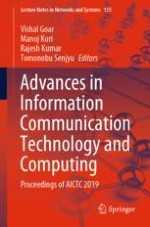2021 | OriginalPaper | Chapter
Automatic Understanding of Code Mixed Social Media Text: A State of the Art
Authors : Neetika, Vishal Goyal, Simpel Rani
Published in: Advances in Information Communication Technology and Computing
Publisher: Springer Singapore
Activate our intelligent search to find suitable subject content or patents.
Select sections of text to find matching patents with Artificial Intelligence. powered by
Select sections of text to find additional relevant content using AI-assisted search. powered by
